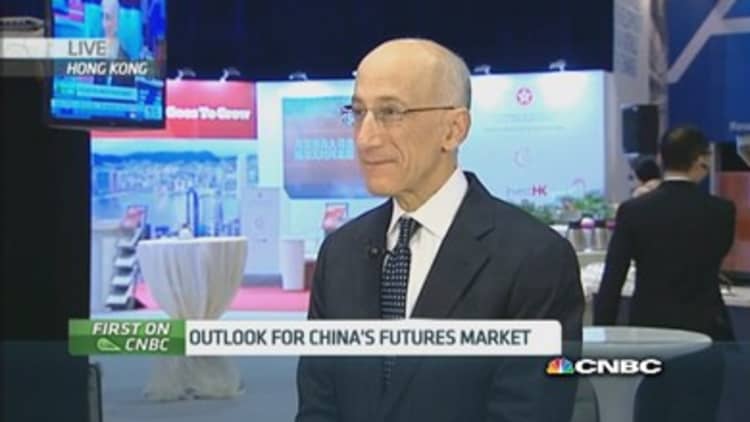Brace for growth numbers starting with "6" from China this year, economists say, after data showed the world's second largest economy expanded at its slowest pace in over two decades in 2014.
China's gross domestic product (GDP) release on Tuesday showed the economy grew 7.3 percent in the fourth quarter from the year-ago period, bringing growth in the full year to 7.4 percent – the weakest performance since 1990.
"The challenges facing China's economy remain as large or even larger compared to a year prior," Brian Jackson, chief economist at IHS Global Insight wrote in a note, citing the cooling property sector, industrial overcapacity and high debt levels as persistent headwinds for the economy.
IHS predicts growth will moderate to 6.5 percent in 2015, far short of a 7 percent official target the government is expected to announce in March, as the government prioritizes economic reform over stimulus
Read MoreChina economy grows at slowest pace in 24 years
While December monthly indicators, including industrial production and retail sales also released Tuesday, pointed to some upward momentum in the economy, economists say this will proved short-lived.
"Brief spells of accelerating Chinese growth are taking place within a larger narrative of China's secular slowdown, a trend which bouts of mini-stimulus and lower commodity prices cannot fully reverse," Jackson said.
For example, the pickup in industrial output growth to 7.9 percent on year in December, from 7.2 percent in November, is a result of the re-opening of factories following a temporary shutdown during the time of the Asia-Pacific Economic Cooperation (APEC) conference, according to Nomura.
Top drag in 2015: Real estate
Of all the headwinds facing the economy, analysts expect the property sector will be the top drag for the economy in the first half of 2015. Real estate is an important pillar of the economy, accounting for approximately 15 percent of GDP and directly affecting dozens of other sectors from steel to construction.
"Chinese growth will continue to face downward pressure because of the slowdown in property investment," said Tommy Xie, economist at OCBC Bank, who sees growth dipping below 7 percent in the first-half.
Property investment growth hit a five-year low of 10.5 percent in 2014 as the market struggled with falling prices, supply overhang and tighter funding conditions, figures showed Tuesday.

"While we've seen an easing of property measures and stabilization in sales volumes, there's a time lag between stronger sales and stronger investments," he said.
While low raw commodity prices should support margins in industry, Louis Kuijs, chief economist of Greater China at RBS, does not expect "corporate investment momentum to improve much either in 2015, given the weak demand prospects and overcapacity in several sectors," he said.
Rescuing growth
Against the backdrop of an uncertain global recovery and a weak property market, more aggressive easing measures are needed to anchor domestic demand and sustain growth, says Qu Hongbin, chief China economist at HSBC.
He expects the People's Bank of China to cut interest rates by 50 basis points and the reserve requirement ratio (RRR) reduced by 150 basis points this year.
But, economists say expectations for any "big-bang" stimulus should be tempered.
"We expect the policy support to come in the form of mildly expansionary fiscal policy and accommodative monetary policy but we think policymakers will remain reluctant to move towards major, high profile stimulus steps, in line with the emphasis in Beijing on 'the new normal' and the stigma attached to 'stimulus' nowadays," said Kuijs.


